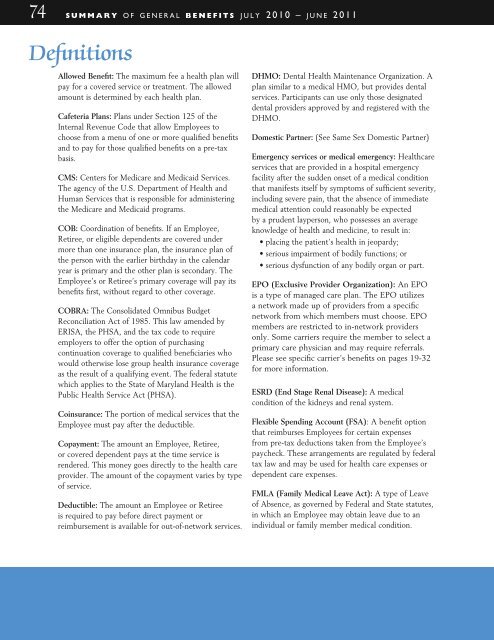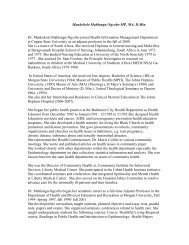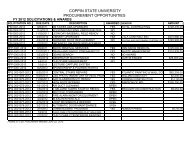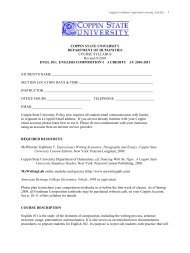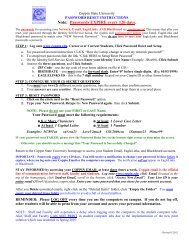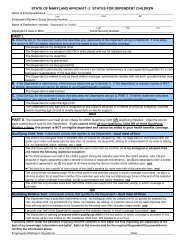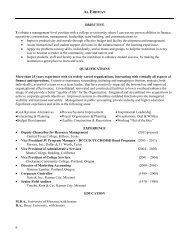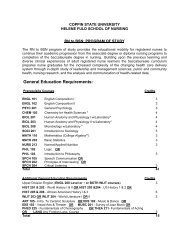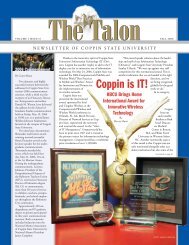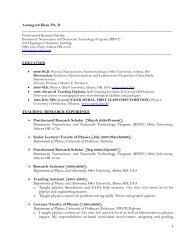FY2011 Health Benefits Booklet
FY2011 Health Benefits Booklet
FY2011 Health Benefits Booklet
Create successful ePaper yourself
Turn your PDF publications into a flip-book with our unique Google optimized e-Paper software.
74 s u m m a r y o f g e n e r a l b e n e f i t s j u l y 2 0 1 0 – j u n e 2 0 1 1<br />
Definitions<br />
Allowed Benefit: The maximum fee a health plan will<br />
pay for a covered service or treatment. The allowed<br />
amount is determined by each health plan.<br />
Cafeteria Plans: Plans under Section 125 of the<br />
Internal Revenue Code that allow Employees to<br />
choose from a menu of one or more qualified benefits<br />
and to pay for those qualified benefits on a pre-tax<br />
basis.<br />
CMS: Centers for Medicare and Medicaid Services.<br />
The agency of the U.S. Department of <strong>Health</strong> and<br />
Human Services that is responsible for administering<br />
the Medicare and Medicaid programs.<br />
COB: Coordination of benefits. If an Employee,<br />
Retiree, or eligible dependents are covered under<br />
more than one insurance plan, the insurance plan of<br />
the person with the earlier birthday in the calendar<br />
year is primary and the other plan is secondary. The<br />
Employee’s or Retiree’s primary coverage will pay its<br />
benefits first, without regard to other coverage.<br />
COBRA: The Consolidated Omnibus Budget<br />
Reconciliation Act of 1985. This law amended by<br />
ERISA, the PHSA, and the tax code to require<br />
employers to offer the option of purchasing<br />
continuation coverage to qualified beneficiaries who<br />
would otherwise lose group health insurance coverage<br />
as the result of a qualifying event. The federal statute<br />
which applies to the State of Maryland <strong>Health</strong> is the<br />
Public <strong>Health</strong> Service Act (PHSA).<br />
Coinsurance: The portion of medical services that the<br />
Employee must pay after the deductible.<br />
Copayment: The amount an Employee, Retiree,<br />
or covered dependent pays at the time service is<br />
rendered. This money goes directly to the health care<br />
provider. The amount of the copayment varies by type<br />
of service.<br />
Deductible: The amount an Employee or Retiree<br />
is required to pay before direct payment or<br />
reimbursement is available for out-of-network services.<br />
DHMO: Dental <strong>Health</strong> Maintenance Organization. A<br />
plan similar to a medical HMO, but provides dental<br />
services. Participants can use only those designated<br />
dental providers approved by and registered with the<br />
DHMO.<br />
Domestic Partner: (See Same Sex Domestic Partner)<br />
Emergency services or medical emergency: <strong>Health</strong>care<br />
services that are provided in a hospital emergency<br />
facility after the sudden onset of a medical condition<br />
that manifests itself by symptoms of sufficient severity,<br />
including severe pain, that the absence of immediate<br />
medical attention could reasonably be expected<br />
by a prudent layperson, who possesses an average<br />
knowledge of health and medicine, to result in:<br />
• placing the patient’s health in jeopardy;<br />
• serious impairment of bodily functions; or<br />
• serious dysfunction of any bodily organ or part.<br />
EPO (Exclusive Provider Organization): An EPO<br />
is a type of managed care plan. The EPO utilizes<br />
a network made up of providers from a specific<br />
network from which members must choose. EPO<br />
members are restricted to in-network providers<br />
only. Some carriers require the member to select a<br />
primary care physician and may require referrals.<br />
Please see specific carrier’s benefits on pages 19-32<br />
for more information.<br />
ESRD (End Stage Renal Disease): A medical<br />
condition of the kidneys and renal system.<br />
Flexible Spending Account (FSA): A benefit option<br />
that reimburses Employees for certain expenses<br />
from pre-tax deductions taken from the Employee’s<br />
paycheck. These arrangements are regulated by federal<br />
tax law and may be used for health care expenses or<br />
dependent care expenses.<br />
FMlA (Family Medical leave Act): A type of Leave<br />
of Absence, as governed by Federal and State statutes,<br />
in which an Employee may obtain leave due to an<br />
individual or family member medical condition.


